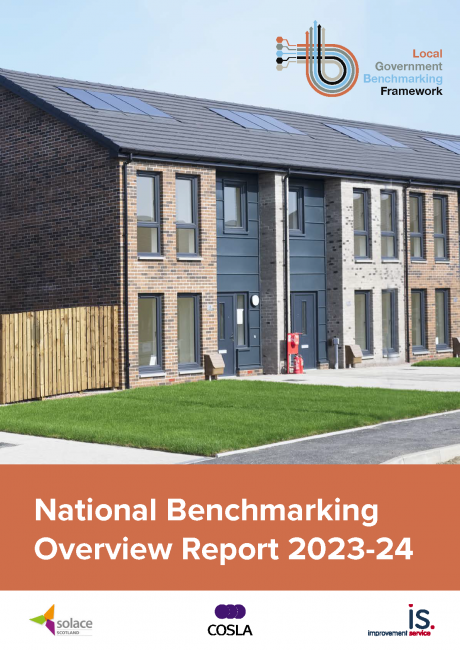 Scotland’s councils are having to make increasingly difficult decisions about the services they deliver as a result of unprecedented financial, workforce and demand pressures, according to the latest Local Government Benchmarking Framework report.
Scotland’s councils are having to make increasingly difficult decisions about the services they deliver as a result of unprecedented financial, workforce and demand pressures, according to the latest Local Government Benchmarking Framework report.
The 13th annual National Benchmarking Overview Report looks at data from 2023/24. It finds that funding levels for councils have not kept pace with the increased demand, growing need and rising costs facing local government for many years. Total revenue funding for councils decreased in real terms by 1.8% in 2023/24, and has fallen by 0.9% over the last decade. In addition, the Accounts Commission reports that at least a fifth of funding provided in 2023/24 is ringfenced or provided with the expectation it will be spent on specific services. These fiscal pressures are forcing councils to make difficult decisions about how they deliver services and what services may have to stop or reduce if they are to deliver balanced budgets.
Sustained financial, demand and workforce pressures have also disrupted performance and efficiency improvements gained in previous years. In the last two years, the rate of decline has overtaken the rate of improvement (45% and 39% respectively), although the long-term picture does remain positive, with 68% of performance indicators within the LGBF showing improvement since the base year.
There are long-term improvement trends in some policy-critical areas. The LGBF data shows strong progress in improving outcomes for children and young people in areas such as attainment and school leaver destinations.
Rising demand
An ageing population and rising costs for everyday essentials are increasing demand for services, particularly in statutory services like social care and housing.
Since 2010/11, the over-65 population has grown by over 26%, which means more people in communities with multiple and increasingly complex needs. The LGBF also provides evidence of the continuing levels of financial hardship being experienced. This includes sustained demand for financial support via the Scottish Welfare Fund and Discretionary Housing Payments.
Further demand pressures are evident in the increasing rates of social, emotional and behavioural difficulties in children and young people. There has been a 41% growth in the number of pupils in need of additional support for learning since 2017/18; currently, 43% of all pupils within mainstream secondary education have identified additional support needs. There are growing concerns about the financial pressures this creates and the capacity within both education and adult services to respond effectively as young people migrate into adult services.
Workforce pressures
Councils continue to face multi-faceted workforce capacity pressures including an ageing workforce, increased service demand, skills gaps, and recruitment and retention difficulties which are impacting overall organisational capacity and resilience. LGBF data continues to record increases in staff absence across the sector, particularly for reasons of stress, mental health and fatigue. In 2023/24, council staff absence levels reached the highest level ever reported.
Council spending
Councils’ financial plans and spending patterns highlight the difficult decisions that are being required to deliver balanced budgets, the LGBF data shows. Councils are relying increasingly on recurring savings, increases to Council Tax, and the use of reserves to bridge the gap between funding and expenditure.
Though revenue expenditure has increased by 2% in real terms in 2023/24, and by 7.7% since 2013/14, it has not kept pace with demographic trends. In 2023/24 alone there was a £6.5 billion shortfall in terms of the spending required just to keep up with demographic change and inflationary pressures. Whilst expenditure within social care, education, and support for care experienced children continues to be sustained, growing since 2010/11 by 29%, 19% and 18% respectively, increased and disproportionate savings are targeted on those areas which are not protected by Scottish Government policies. This has included a 26% reduction in culture and leisure spending, 13% reduction in roads spending and a 25% reduction in planning spending since 2010/11.
The welcome news is that, despite the many challenges it faces, the local government sector is taking proactive steps to mitigate their effects. It has committed to a programme of sector-led performance improvement and transformation to ensure sustainability of services.